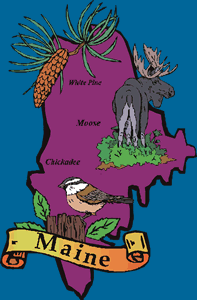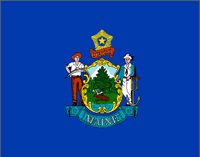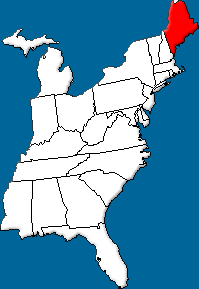 History:
Vikings, led by Leif Ericson, were probably the first Europeans to visit Maine around the year 1000 AD. In 1448, John Cabot, an Italian explorer in the service of England, reached the Maine coast. France sent many explorers during the 16th and early 17th century, but no official settlement was made until 1607 when King James I of England awarded a grant to the Plymouth Company for the establishment of Fort St. George on the site of present day Phippsburg. The settlement did not prosper and colonists returned to England one year later.
In 1622, the Council for New England - successor to the Plymouth Company - gave Ferdinando Gorges (a wealthy Englishman) and Captain John Mason a large tract of land in present day New Hampshire and Maine. The land was divided between the two men in 1629, and Gorges retained the Maine section. He chartered America's first English city, Gorgeana (now York), in 1632.
Gorges died in 1647, and Maine fell under control of the Massachusetts Bay colony in 1652. A period of turbulent times followed. Many struggles occurred between the English on one side, and the Native Americans and French on the other side. A series of French and Indian wars were fought in Maine and throughout New England between the years 1689 and 1763.
The French and their Indian allies hoped to wrestle control of the area from the English settlers. In 1763, the Treaty of Paris ended the conflict and severed all French claims to Maine and most of North America.
Dissatisfaction with the British Stamp Act of 1765 spread throughout the American colonies. A number of societies formed throughout Maine to support the boycotting of English goods. Maine colonists burned a supply of British tea at the "York Tea Party" in 1774 - one year after the famous "Boston Tea Party."
Large numbers of Maine men joined the Revolutionary Army when the war began in 1775. That same year, British forces devastated the city of Falmouth (Portland) in a move to punish colonists for opposition to King's policies. The Revolutionary War's first naval battle took place off the coast of Maine. A British ship - the Margaretta - was captured by a group of Maine patriots in 1775.
When the war ended in 1783, Maine experienced a period of rapid economic development. Although the Embargo Act of 1807 hurt Maine's shipping industry by limiting the amount of U.S. trade with other countries, the colony began to focus on its manufacturing industries.
By 1785, a strong desire to separate from Massachusetts and declare statehood grew within the colony of Maine. Colonists were frustrated with the long distance to the capital city of Boston, inadequate roads, and heavy taxation. In 1819, colonists voted for separation and Maine was admitted to the Union as a free state in 1820, as part of the Missouri Compromise.
The capital of Maine was originally established in Portland but was moved to Augusta in 1832. During the first half of the 19th century, Maine enjoyed a very prosperous period. The state's population steadily increased, its timber industry thrived, and several of its towns became leaders in shipbuilding. Even the state's long-standing border dispute with New Brunswick was settled with the Webster-Ashburton Treaty with Great Britain in 1842.
One of the state's chief political issues during the 19th century was the regulation of liquor traffic. In 1851, Maine became the first state in the Union to adopt a prohibition law that forbade the manufacture and sale of alcohol. It remained in place until 1934.
Because of its strong anti-slavery sentiments, Maine made significant contributions of men and money to the Union cause during the Civil War (1861-1865). Seventy-two thousand Maine men fought for the Union army. |









